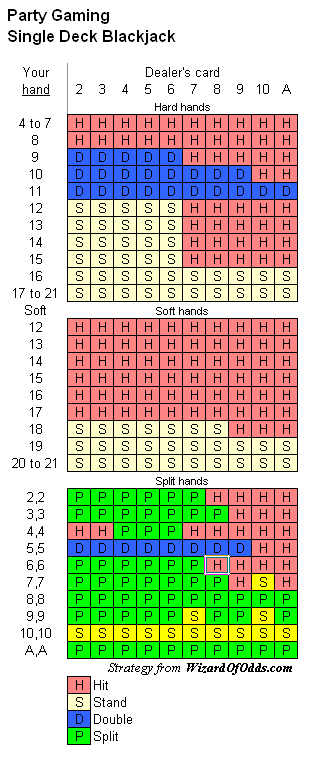Ask The Wizard #175
Could You please make a chart for Party Poker single deck blackjack. Also, with best play, what are the odds.
As I read them, the rules are:
- 1 deck
- Dealer hits soft 17
- Double only on 9 to 11
- Double after split allowed (subject to 9 to 11 rule)
- No surrender
- Blackjack pays 3 to 2
- Dealer always peeks for blackjack
Here is the basic strategy.

The house edge under these rules is 0.16%.
If there are three people, then What is the probability that at least two persons have the birthday on the same date.
Ignoring leap day, the probability of all three different birthdays is (364/365)*(363/365) = 0.99179583. So the probability of at least one common birthday is 1 - 0.99179583 = 0.00820417.
Always, great site. I am hoping that you can settle an argument between myself and a friend of mine concerning online Bingo. The web-site allows you to buy bingo cards for 10 cents a piece. Assuming one has 5.00 to spend, my friend believes you have are better off buying 50 cards and playing one time instead of buying a single card each game at .50 and playing 10 times. I disagree and believe that since no matter how many cards you buy, they are .10 cents a piece, it makes no difference if you play them all at once or spread them out?
Thanks for the compliment. The answer depends on how the jackpot is determined by the bingo site. If it is a percentage of total cards sold, which is usually the case, then it wouldn’t make any difference. However, if there is a fixed prize for the winner, then it would be better to play one game at a time, lest you compete against yourself.
I realize that the house edge allows a casino to make much of its money. But please help settle a bet: If a casino had no house edge, say paid double on a coin toss, wouldn’t the casino still be likely to come out ahead based on the poor money management of its patrons? In particular, don’t people tend to quit when they’ve lost money and can’t afford to go on? Thanks! Love the web site.
I’ve addressed this before and I disagree with your hypothesis. As I have said many times, all betting systems are equally worthless. Thus, if the casino had no house edge it would neither win nor lose money over the long run. Let’s say every player had the goal of winning $1,000,000 or go bust trying. Most would go broke but the few players that won the $1,000,000 would even things out.
Since taking/laying odds is an even-edged play, do you know if casinos generally include or exclude those from their comp calculations?
That is a good question. Here in Vegas it varies by casino. I would say that most of them exclude odds in comp calculations, others only count odds up to a point, like 2x, and some count the full amount. I would love to name names but casinos are protective of their comping policies and much of what I know was given “off the record.”
I deal 3 Card Poker and I like to play my tip bets on the ante. Will I win more money for myself on the ante or should I be going for the long shot on the pairs plus bet? Thanks!
If you can trust the player to make the raise bet when he raises his own bet then you should put the tip on the ante. However, if the player will never make the raise bet for you, then the tip would carry a 10.11% house edge, making the Pairplus the much better bet.
When I first got a casino player card to rate my play, I had two cards for the account and shared one with my mom so we could get a higher rating. Eventually she got her own card and now when we play side by side, spending the same amount of time and money, she will rate higher returns in bonus cash. She also rates higher returns at other casinos even though we never shared a card at them. Do casinos share player ratings? And why after a number of years of playing individually am I still not receiving the same player rating as my mom when we basically play the same way? The casinos give me no answers on how they rate players. Also, a friend of ours goes to the casino maybe once or twice a year, spends about the same as we do per visit (yet we go 6 to 8 times a year, spending more), and she gets even higher bonus cash than both of us combined! Can you explain this and advise how to correct it?
I wish I had a good answer for you. Usually cash back or free play is a percentage of points earned. However, it doesn’t sound like this is the case with your casino. Mailers are often a mystery. Here in Vegas, professional gamblers often exchange information about play vs. mailer, to try to determine the least amount of play required to get the best mailer. It also sometimes has to do with the average play per trip. So often it can hurt you to play just a little bit per day. Tournaments and comps can get even more mysterious. Yes, casinos do indeed share information with other casinos in the same company, which sometimes results in getting offers from casinos you rarely or never play at. It also sometimes helps to play hard-to-get. If you play on a regular basis, the casino’s rating formula may peg you as somebody who will play regardless of incentive. However, an intermittent player may need more enticing to get through the door. If the casino told you everything about how it rewards players, managers would be concerned that you may discover the system and begin playing as little as possible to get the greatest reward.
Just wanted to know if you knew where the majority of casinos here in Vegas buy their craps tables. And if these companies sold their tables to the public?
Two suppliers of gaming tables I am aware of are TCS John Huxley and Midwest Game Supply. They probably do sell to the public. The price of a craps table at Midwest Game Supply is $3,950. If a used one will suffice, the Gambler's General Store sells used tables.
A local casino is offering a action chip bonus to their O/U 13 sidebet. If you bet at least $5 on your hand and a minimum of $5 on either the O/U bet, if your first two cards are suited, you win a $5 action chip. If you suited hand matches the dealers, you win $10 in action chips. The action chips can only be used for a regular BJ bet, if you win a bet using the action chip it is replaced with a casino $5 chip, if you push you can use again for another hand, it cannot be used for DD’s or splits. Is this game worth playing, $5 a hand with $5 O/U bet?
Assuming six decks, the probability your cards will be suited, but not suited to the dealer’s up card is (77/311)*(234/310) = 18.69%. The probability your two cards and the dealer’s up card will be suited is (77/311)*(76/310) = 6.07%. From my blackjack appendix 4, we see the probability of a win in blackjack is 42.39% and a loss is 49.10%. The probability of a win before a loss is 42.39%/(42.39%+49.10%) = 46.33%. So an action chip is worth about 46.33% of face value. The value of this promotion is 46.33%*(18.69%*$5+6.07%*$10) = 0.7142, or about 71 cents per hand. The expected loss on a $5 blackjack bet is about 3 cents. From my blackjack appendix 8, we see the house edge on the over-13 bet is 6.55%, so the expected loss on a $5 bet would be $5*0.0655 = 0.3275. Therefore, the expected loss due to the house edge of both bets is about 36 cents, and the expected gain is 71 cents, for a net gain of 35 cents per pair of bets.
If blackjack switch has a lower house percentage than regular black jack, why would casinos allow it?
The reason is players make more mistakes in Blackjack Switch.
The version of Fun 21 offered on Carnival cruise lines has some rules that are surprisingly favorable. They are so favorable that they appear to make up for the hit on soft 17 and then some. I can't find the catch. Any chance the edge is better then standard big casino Vegas blackjack or even slightly in players favor? Whether you answer or not, GREAT SITE and thanks much.
Thanks. This game is just a rip-off of Spanish 21. Note that the bottom of the card says that all queens are removed.




